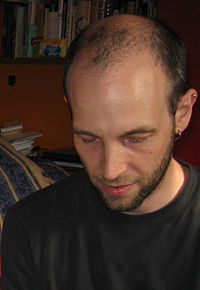Kevin Buzzard
Kevin Buzzard | |
|---|---|
 | |
| Born | 21 September 1968 |
| Alma mater | Trinity College, Cambridge |
| Awards | Whitehead Prize (2002) Senior Berwick Prize (2008) L.M.S. |
| Scientific career | |
| Fields | Mathematics |
| Institutions | Imperial College London Harvard University |
| Thesis | The Levels of Modular Representations (1995) |
| Doctoral advisor | Richard Taylor |
| Doctoral students | Daniel Snaith |
Kevin Mark Buzzard (born 21 September 1968) is a British mathematician and currently a Professor of Pure Mathematics at Imperial College London. He specialises in algebraic number theory.
He obtained a B.A. degree (Parts I & II) in Mathematics at Trinity College, Cambridge, where he was Senior Wrangler (achiever of the highest mark), and went on to complete the C.A.S.M.. He then completed his dissertation, entitled The levels of modular representations, under the supervision of Richard Taylor,[1] for which he was awarded a Ph.D. degree.
He took a lectureship at Imperial College London in 1998, a readership in 2002, and was appointed to a professorship in 2004. From October to December 2002 he held a visiting professorship at Harvard University, having previously worked at the Institute for Advanced Study, Princeton (1995), the University of California Berkeley (1996-7), and the Institute Henri Poincaré in Paris (2000).[2]
He was awarded a Whitehead Prize by the London Mathematical Society in 2002 for "his distinguished work in number theory",[3] and the Senior Berwick Prize in 2008.[4] While attending the Royal Grammar School, High Wycombe he competed in the International Mathematical Olympiad, where he won a bronze medal in 1986 and a gold medal with a perfect score in 1987.
In 2017, he launched an ongoing "virtual student" project which promoted the use of computer proof verification systems in future pure mathematics research.[5] [6]
References
- ^ Kevin Buzzard at the Mathematics Genealogy Project
- ^ Curriculum vitae, Kevin Buzzard. 2012. [pdf]
- ^ Citation for Kevin Mark Buzzard
- ^ LMS Prizewinners Archived 2007-08-04 at the Wayback Machine
- ^ Xena Project
- ^ kbuzzard/xena at GitHub
External links
- 1968 births
- 20th-century British mathematicians
- 21st-century British mathematicians
- Institute for Advanced Study visiting scholars
- Living people
- Number theorists
- Harvard University staff
- Alumni of Trinity College, Cambridge
- Academics of Imperial College London
- People educated at the Royal Grammar School, High Wycombe
- Whitehead Prize winners
- International Mathematical Olympiad participants
